5+ Sample Seminar Event Proposal
-
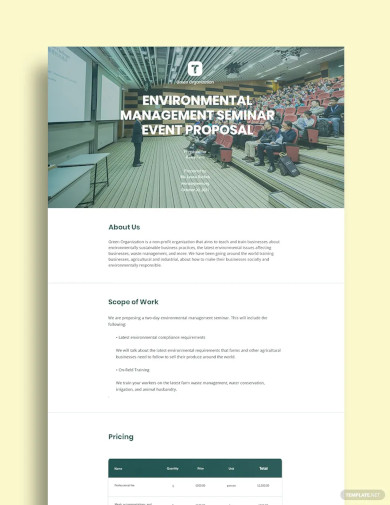
Seminar Event Proposal Template
download now -

Seminar Event Proposal Outline Template
download now -
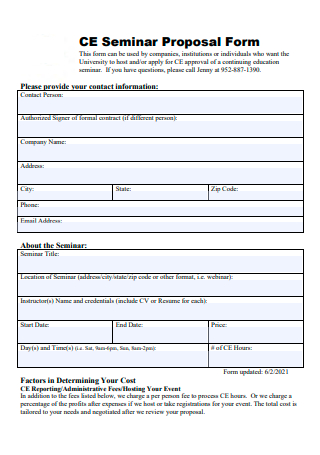
Seminar Workshop Event Proposal Form
download now -
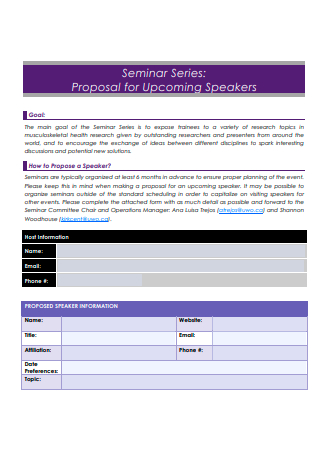
Seminar Letter Series Event Proposal
download now -
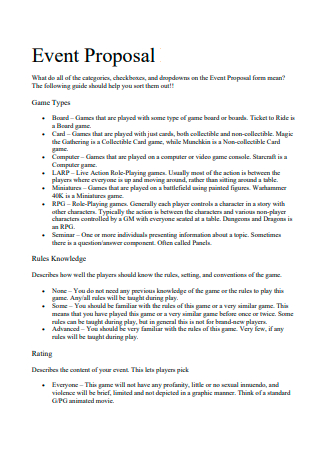
Printable Seminar Event event Venue Proposal
download now -
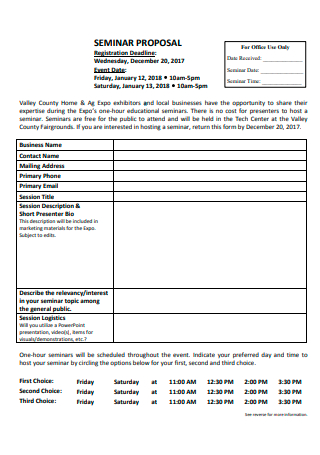
Formal Seminar Conference Event Proposal
download now
FREE Seminar Event Proposal s to Download
5+ Sample Seminar Event Proposal
What Is a Seminar Event Proposal?
Elements of an Effective Event Proposal
Benefits of Attending Seminars
How to Make a Seminar Event Proposal
FAQs
What is the purpose of a seminar?
What are the disadvantages of a seminar?
What to avoid in a seminar?
What is a good seminar?
What Is a Seminar Event Proposal?
A seminar is a Group discussion led by a subject matter expert on a particular topic or discipline, such as business, job hunting, or a university field. A seminar is a more formal gathering that focuses on training or information exchange but is shorter in duration. A seminar event proposal is a document that you provide to a client to give them complete information about the services you will supply for a certain event and give them the opportunity to assess the features you are doing to make their event a success. Due to its importance, you should view the event proposal for the seminar sample provided in this article.
Elements of an Effective Event Proposal
Event planning, like any other business, is a difficult cookie to crack if you don’t know how to draft a seminar event proposal that will make clients beg for your services. Since planning an event is such a big responsibility, many individuals hire professionals to make sure the event’s main objectives are reached. An event planner must demonstrate their commitment to the task. Although it implies that you should avoid taking any shortcuts, using a template will help you prioritize other details. Keep these elements in mind when making a seminar event proposal.
Benefits of Attending Seminars
Seminars are usually held over a few days and include cooperative discussion, numerous presenters, and the opportunity to share viewpoints and concerns on the topic. Attending a seminar may help you improve your communication skills, receive expert information, network with others, and reinvigorate your motivation and confidence, among other things. If your guests are wary to join the seminar, you can suggest these improvements to their skills.
How to Make a Seminar Event Proposal
It’s time to get started on the duties below after your seminar has been approved at the very least, four to six months before the event. The earlier you can prepare the seminar event proposal, the better so you won’t have to rush to complete the necessary details. To save you time and effort, you should make use of a template for an event proposal for a seminar so you can focus on contacting speakers, the location, or other important details included in the proposal. Without further ado, proceed to the guide below and thoroughly each of the steps prepared in this article.
-
Step 1: Establish Your Goals and Objectives
First, make a list of the Goals of your seminar. For the very first step in coming up with a seminar event proposal, you need to be aware of the goals and objectives for the purpose of the seminar you are planning. As mentioned, there are different kinds of seminars with different topics available. You should determine the purpose and content before moving on to the other steps so you will be aware of who should join the seminar. Then decide how many people you would like to invite and come in person or watch your live feed.
-
Step 2: Put Together a Rough Budget
Consider the costs of previous seminars or webinars to help you set competitive pricing for your event without compromising Profit. If you are unsure about any of the facts, you may make informed estimates based on some fast research and fill in the blanks. This extra step guarantees that you develop a realistic budget so that you are not surprised by unexpected costs as your event approaches. To minimize budget shocks and stay on pace with your expenditures, keep your financial information under control. If applicable, contact your confirmed sponsors to finalize sponsorship donations so you know how much money you will get.
-
Step 3: Include Venue Details
As part of the event venue proposal, you may need to collaborate with your caterer on a menu for in-person events, taking into consideration any particular dietary needs of participants. Book any required audio or video equipment for in-person speakers or live streaming. Review any security requirements and create a security plan if necessary. This is also the time to apply for any specific permissions or licenses required by your venue. Create signs and a Communication strategy for attendees to make communication easier before and during the seminar, which is especially necessary if limitations are in place. Promotion.
-
Step 4: Finalize Speakers
As the day of your event approaches, you will need to finalize some arrangements, such as speaker fees and Contracts. It’s also an excellent opportunity to solicit biographies and images from attendees so you can update your website or promotions and event description. Make arrangements for in-person events, including travel and lodging, and communicate these details with your client or seminar hosts as needed. Make sure to do a background check on the speakers your client or your company has scouted to invite for the seminar before contacting them. It’s important to be aware of their expertise to avoid a clash of ideas they present against the proposed topic your client wanted.
-
Step 5: Start Promotion
To create your brand and grow your audience, seminar and webinar best practices necessitate event marketing. to promote your incoming seminar event, you can create a message document that is consistent with your brand, include seminar marketing in your email and social media campaigns, make a Facebook event and social media promotional videos, make your class available on internet event calendars. If you need help planning your marketing schedule, use the available templates provided on this site.
FAQs
What is the purpose of a seminar?
A seminar, in its most basic form, is a gathering where individuals may learn about a topic. Many small company owners ask if they can afford to attend or send employees to one. When employers or workers are busy, they may feel unable to take time away from work to attend a seminar. Understanding the goal of a seminar can assist small company owners in determining whether or not it is beneficial to attend. Though if you would attend, it could help boost motivation, expand your educational knowledge and expand your networking prospects, though be aware of scammers who may approach you.
What are the disadvantages of a seminar?
Of course, there is a fee, since all guests are responsible for their expenses. The seminars themselves may have an admission price that is fairly costly at times. The attendees are responsible for all travel, meals, accommodation, and any additional expenses. There is also a possibility that the themes will not directly benefit your business or worries, and that the seminar will be a waste of time in which you will learn nothing useful. As well as the possibility that seminar participants may have unrealistic expectations and consequently be disappointed. Here, realism must prevail. These aren’t ‘quick fixes’ for anything.
What to avoid in a seminar?
Event planners who are not familiar with a proposal for the event may not be aware of the don’ts during a seminar. These don’ts are usually waiting until the last minute to prepare, create difficult-to-read or comprehend presentations, read your lecture verbatim from notes or slides, and avoid using distracting movements while speaking. Don’t mumble and don’t speak in a monotone. Talking to a single person or a computer screen is not a good idea. Most importantly, not every joke is acceptable. Humor has a place in your seminar, but it should be used sparingly.
What is a good seminar?
Seminar speakers that are good at their task, understand that the audience’s attention peaks early in the presentation. Put your seminar’s main topic at the very start, and then use the rest of your time to expand out the ideas. This is also beneficial since the seminar may cut the presentation short if the duration is lengthy and could run out of time. To avoid compromising the essence of the speaker’s presentation, they should be aware of the flow of their talk. Moreover, a good seminar does not solely fall on the responsibility of the speaker, but to the event planner as well. Hence why you would need to view the example of the seminar event proposal to get a better picture of the format.
Planning a seminar will be a challenge if you are not aware of what the process is nor what is contained in the proposal itself. This is why this article is helping you out through the guide of writing a seminar event management proposal in order to compile all of the necessary information in one but also be able to present it smoothly to your client. Make sure you did not overlook any other relevant detail to avoid going through a process of revisions and changes if the client is not pleased with your proposal. With that being said, start writing a seminar event proposal now!
